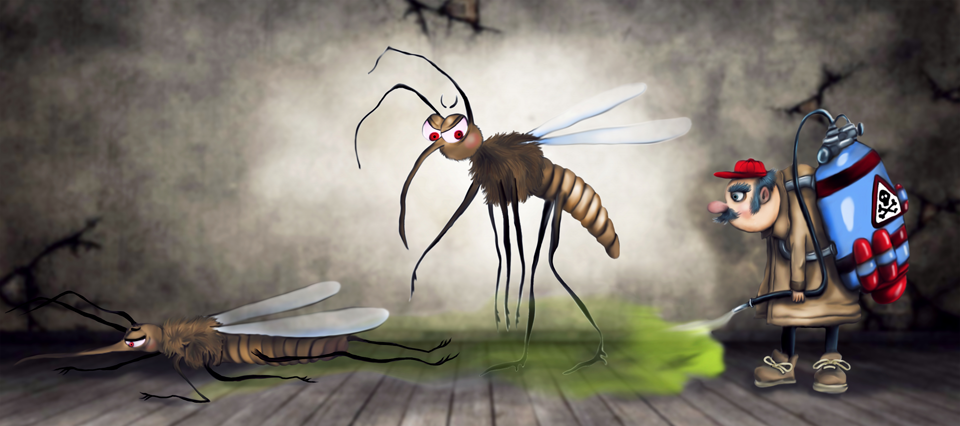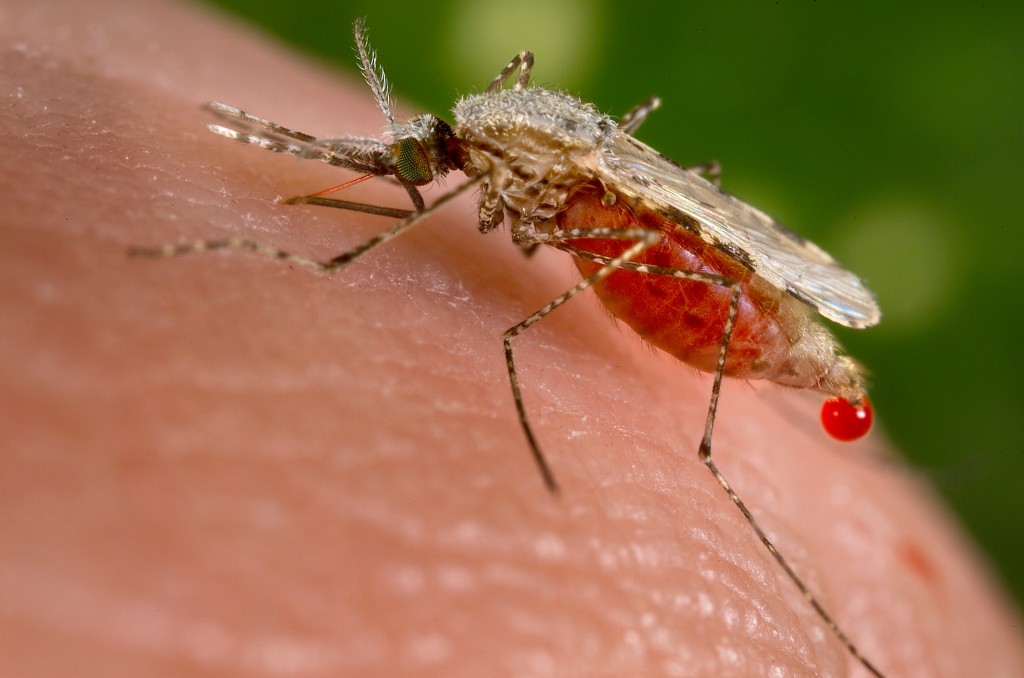Mosquitoes are intrepid little two-winged insects that have a tendency to spoil the best of holidays. No sooner do you step outside your rented cottage by the lake on a splendid summer day, than myriads of starving insect vampires come swarming all over you like so many children around a strawberry ice-cream.
With more than 3,500 species of mosquitoes roaming the planet and 13 genera in the USA alone, it’s all you can do to keep them off your track. And you should do everything in your power to avoid mosquito bites because these tiny creatures are the deadliest animals on the Earth.
You’d think to count yourself lucky for not bumping into a bear or a vicious weasel, but think again. Mosquitoes can sense the carbon dioxide from your breath and the lactic acid on your skin from over 100 feet away(what else attracts mosquitoes). They’ve been around for over 30 million years, so they’ve had plenty of time to perfect their skills. And they are known vectors for encephalitis, Nile Virus, malaria, yellow fever, Dengue fever and many other contagious and life-threatening diseases, to boot. It doesn’t stop here; they carry heart-worm parasites, which can be lethal to our canine companions.
To make matters worse, mosquitoes enjoy enviable longevity, as insects go. If it weren’t for our urge to slap them silly as soon as they dare to plunge their malicious suckers into our precious, sun-kissed skin, they’d make it to 5 or 6 months of parasitic indolence.
To understand how to keep mosquitoes at bay, you must first understand how they track their prey, namely you. They use:
- Visual sensors in the eyes. They zero-in on anything that does not blend in with the background, especially if it moves. Camouflage gear is in order if you’re trying to enjoy the outdoors more than the outdoors are trying to enjoy you.
- Heat sensors around their mouth parts. Mosquitoes are so good at detecting heat, infrared light and plain old light generated by warm-blooded animals that it’s a wonder they’re not used in combat strategy. Therefore, finding ways to keep cool in the summer could also ward off mosquitoes.
- Chemical sensors in the antennae. We give off body odor, lactic acid and carbon dioxide through our breath and perspiration, like all other mammals and birds. Mosquitoes are wise to this, and they don’t miss a chance to find out just what is emanating the chemicals. If you can help it, you should try to sweat less. If not, then know that no amount of deodorant can save you from the pesky insects.
Mosquitoes harness all of their sensing mechanisms to be able to locate their prey. Luckily for them, the sensors are all conveniently located on their heads, along with the mouth parts. The female has a proboscis for biting, while the male has a palpus for collecting nectar. The female needs blood to produce her eggs, and so evolution has developed all the tools she may need to carry out her dirty work: the trump to pierce the skin and suck blood out, the saliva to lubricate the opening in said skin, and anticoagulants to prevent the blood from clotting.
They also need water to lay their eggs, so most any type of recipient with standing water, from swimming pool to plant pot, will most likely host tiny mosquito eggs by the thousands. The Aedes mosquitoes are the only ones that prefer to lay eggs above water level.
Before looking into some of the methods used to pro-actively prevent mosquito bites, it would be useful to draw your attention to some unavoidable factors which, according to recent studies, are known to attract mosquitoes: blood type, skin bacteria, exercise, dark clothes, pregnancy and genetics. Granted, some are slightly more avoidable than others, but when faced with a swarm of mosquitoes, there’s hardly anything that can be done to stop any of these elements from selling you down the river.
Prevention
To prevent mosquito bites, you must first take care to tick all the above-mentioned boxes: avoid generating heat, chemicals and visual signals.
Wear clothes that cover as much of your body as possible and that blend in with the scenery. It won’t do you much good to be covered in red clothes from head to toe in the midst of a jungle.
One way to avoid mosquito bites is to use repellents. Look for anything that contains NN-diethyl-meta-toluamide, or DEET. They can come in many shapes and sizes, from creams, ointments, sprays and powders to pre-treated wristbands. Children are recommended a 15% concentration, but adults can use anything from 7.5% to 100%, if they so choose. The concentration will determine how long it will be before the effect runs off.
Pesticides are an unpopular alternative, but an alternative nonetheless. Permethrin, for instance, can only be used on clothing as it functions as a neurotoxin. Many other types of pesticide can be used around the house or indoors. If you can afford it and your flight carrier allows it, taking some on your holiday to use on a rented cottage.
Luckily, many communities carry out large-scale mallothione and other pesticide spraying, and most resorts will not have you spending the best part of your holiday squatting mosquitoes.
Avoid moving around much, especially after dusk. Just because travel companions can’t see you fidgeting, it doesn’t mean that a mosquito won’t.
Avoid standing next to sources of heat and light. We all love a camp fire to dry out the muddy boots and to warm up the bones, but mosquitoes abide by a very simple principle: ‘where there’s blood, there’s fire’.
Then, dispose of any stagnant water. This could refer to the water in your swimming pool, bird bath, plant pot, dog’s dish, garden water butt or any other possible receptacle with water that is not fresh.
Try not to be out in the open with a source of water nearby. Females laying their eggs love a nice oasis and don’t like to travel much to procure their food, so if you’re camping by a lake, the odds are against you.
Spruce up your windows with this year’s latest window screen styles. Alright, they’re not easy on the eye, we grant you that, but they’ll keep mosquitoes and many other insects from trespassing.
Mosquito magnets
Mosquito magnets are like having a CO2-emmiting robot that impersonates you so well that you’ll eventually become redundant to your own mosquito-squatting strategy. With a mosquito magnet, you can stop mosquito bites for yourself and an army of people over a certain radius. It emits CO2 artificially using a catalytic converter, perspires octenol or Lurex (chemicals which simulate plant emissions or sweat), produces warmth and moisture, and vacuums the insects. The results of this method are widely dependent upon the type of mosquito targeted and the type of lures used, and any mismatch would make the magnet useless.
Mosquito birth control
Mosquito birth control is a newly-developed long-term strategy to avoid mosquito bites and, as outlandish as it sounds, it was developed due to the immunity that malaria vectors have acquired toward traditional methods, including indoor insecticide spraying and pre-treating bed nets.
Much to the chagrin of organic enthusiasts and self-proclaimed Mother Nature devotees, citronella oil is only effective in high concentrations, which require plants to be sacrificed en masse. However, used in combination with other oils and quite profusely splashed about, citronella oil could give you some comfort. Blend it with lemon eucalyptus oil, cinnamon oil, castor oil, rosemary oil, cedar oil, peppermint oil, clove oil or geranium oil, but beware of the side-effects they have on skin. It is best to consult a physician prior to applying any of these oils on your skin, especially as they most likely contain one form or other of solvent or stabilizer. Natural compounds aren’t necessarily also safe for you, so follow the manufacturer’s guidelines at all times.
Ultraviolet light
Ultraviolet light used in bug zappers, as eco-friendly as it sounds, seems to be harmless to mosquitoes, as well, not only humans, so we can safely tick that off the list.
Naturally, a good deal of research on the subject is currently under way, and it’s only a matter of time before people will be able to disarm their main enemy, the mosquito. We have a plethora of options at our fingertips, some more effective or more appropriate than others, and it is our duty to try them out, because then and only then can we enjoy the outdoors without worrying about contracting a life-threatening disease.


